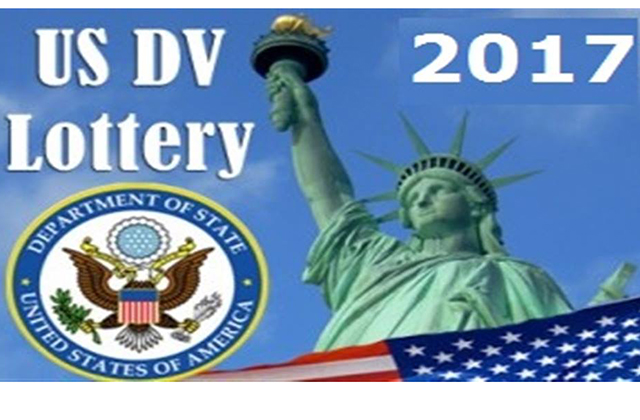
ՀՀ-ում ԱՄՆ դեսպանատունը զգուշացնում է
2016-09-28 13:44:00
2016-09-28 13:44:00
 Բազմազանության արտոնագրի դիմորդներ-միայն «.gov» վերջավորությամբ ավարտվող կայքերն են ԱՄՆ կառավարության պաշտոնական կայքերը: Մնացած բոլոր կայքերը («.com», «.org» «.net» վերջավորություններով) որոնք տրամադրում են ներգաղթի և վիզայի հետ առնչվող տեղեկատվություն կամ ծառայություն չի երաշխավորում, խորհուրդ չի տրվում կամ չի ֆինանսավորում Պետդեպարտամենտի կողմից: Զգուշացե՛ք ցանկացած անձից, ով պահանջում է առցանց տրամադրել անձնական տեղեկություն:
Բազմազանության արտոնագրի դիմորդներ-միայն «.gov» վերջավորությամբ ավարտվող կայքերն են ԱՄՆ կառավարության պաշտոնական կայքերը: Մնացած բոլոր կայքերը («.com», «.org» «.net» վերջավորություններով) որոնք տրամադրում են ներգաղթի և վիզայի հետ առնչվող տեղեկատվություն կամ ծառայություն չի երաշխավորում, խորհուրդ չի տրվում կամ չի ֆինանսավորում Պետդեպարտամենտի կողմից: Զգուշացե՛ք ցանկացած անձից, ով պահանջում է առցանց տրամադրել անձնական տեղեկություն:
Մանրամասների համար այցելեք այստեղ.
ELIGIBILITY
1. What do the terms “native” and “chargeability” mean?
Native ordinarily means someone born in a particular country, regardless of the individual’s current country of residence or nationality. Native can also mean someone who is entitled to be charged to a country other than the one in which he/she was born under the provisions of Section 202(b) of the Immigration and Nationality Act.
Because there is a numerical limitation on immigrants who enter from a country or geographic region, each individual is charged to a country. Your chargeability refers to the country towards which limitation you count. Your country of eligibility will normally be the same as your country of birth. However, you may choose your country of eligibility as the country of birth of your spouse, or the country of birth of either of your parents if you were born in a country in which neither parent was born, and in which your parents were not resident at the time of your birth. These are the only three ways to select your country of chargeability.
Listing an incorrect country of eligibility or chargeability (i.e., one to which you cannot establish a valid claim) will disqualify your entry.
2. Can I still apply if I was not born in a qualifying country?
There are two circumstances in which you still might be eligible to apply. First, if your derivative spouse was born in an eligible country, you may claim chargeability to that country. As your eligibility is based on your spouse, you will only be issued an immigrant visa if your spouse is also eligible for and issued an immigrant visa. Both of you must enter the United States together using your DVs. Similarly, your minor dependent child can be “charged” to a parent’s country of birth.
Second, you can be “charged” to the country of birth of either of your parents as long as neither of your parents was born in or a resident of your country of birth at the time of your birth. People are not generally considered residents of a country in which they were not born or legally naturalized, if they were only visiting, studying in the country temporarily, or stationed temporarily for business or professional reasons on behalf of a company or government of a country other than the one in which you were born.
If you claim alternate chargeability through either of the above, you must provide an explanation on the E-DV Entry Form, in question #6.
Listing an incorrect country of eligibility or chargeability (i.e., one to which you cannot establish a valid claim) will disqualify your entry.
3. Why do natives of certain countries not qualify for the DV Program?
DVs are intended to provide an immigration opportunity for persons who are not from “high admission” countries. US law defines “high admission countries” as those from which a total of 50,000 persons in the Family-Sponsored and Employment-Based visa categories immigrated to the United States during the previous five years. Each year, U.S. Citizenship and Immigration Services (USCIS) counts the family and employment immigrant admission and adjustment of status numbers for the previous five years to identify the countries that are considered “high admission” and whose natives will therefore be ineligible for the annual Diversity Visa program. Since USCIS makes this calculation annually, the list of countries whose natives are eligible or not eligible may change from one year to the next.
4. How many DV-2018 visas will go to natives of each region and eligible country?
United States Citizenship and Immigration Services (USCIS) determines the regional DV limits for each year according to a formula specified in Section 203(c) of the Immigration and Nationality Act (INA). The number of visas the Department of State eventually will issue to natives of each country will depend on the regional limits established, how many entrants come from each country, and how many of the selected entrants are found eligible for the visa. No more than seven percent of the total visas available can go to natives of any one country.
Go NEXT >> Questions 5 – 8
Այս նյութը դիտել են - 7526 անգամ